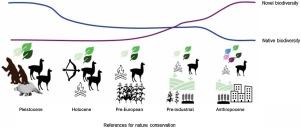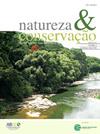人类世的拉丁美洲生物多样性保护仅靠过去的参考资料是不够的
IF 3.5
2区 环境科学与生态学
Q1 BIODIVERSITY CONSERVATION
引用次数: 0
摘要
拉丁美洲的保护政策往往暗含假设,即以过去的参照物来定义值得保护的生态系统。然而,更新世/人类之前的参照系是基于不可能恢复的生物物理条件;全新世早期的参照系忽视了早期人类很可能造成大规模物种灭绝;欧洲之前的参照系没有承认土著社会往往是不可持续的,许多宝贵的生态系统在一定程度上是殖民时期遗留下来的;工业化之前的参照系低估了生物入侵、现代技术和社会经济发展在保护、增加或产生生物多样性方面的作用。人类世的快速发展要求制定前瞻性政策,将变化作为生物多样性和复原力的来源,积极接受城市化和现代农业可以在保护中发挥关键作用的观点,挑战普遍存在的本土主义和生态警报主义,并强调研究应侧重于塑造未来的社会生态情景,这必然不同于过去。本文章由计算机程序翻译,如有差异,请以英文原文为准。

Past references are insufficient for Latin American biodiversity conservation in the Anthropocene
Often, Latin America conservation policy implicitly assumes past references to define worth-conserving ecosystems. However, the Pleistocene/pre-human reference is based on biophysical conditions impossible to be restored; the early Holocene reference overlooks that early humans likely caused massive extinctions; pre-European references fail to acknowledge that indigenous societies were often unsustainable and that many valuable ecosystems are in part a colonial legacy; pre-industrial references underplay the role of biological invasions, modern technology and socioeconomic development to preserve, increase or generate biodiversity. The Anthropocene rapid dynamics requires forward-looking policies that incorporate change as a source of biodiversity and resilience, actively accept that urbanization and modern agriculture can play a key role in conservation, challenge the prevalence of nativism and eco-alarmism, and emphasize that research should focus on shaping future socio-ecological scenarios, that would necessarily differ from the past.
求助全文
通过发布文献求助,成功后即可免费获取论文全文。
去求助
来源期刊

Perspectives in Ecology and Conservation
Environmental Science-Nature and Landscape Conservation
CiteScore
7.80
自引率
4.30%
发文量
46
审稿时长
59 days
期刊介绍:
Perspectives in Ecology and Conservation (PECON) is a scientific journal devoted to improving theoretical and conceptual aspects of conservation science. It has the main purpose of communicating new research and advances to different actors of society, including researchers, conservationists, practitioners, and policymakers. Perspectives in Ecology and Conservation publishes original papers on biodiversity conservation and restoration, on the main drivers affecting native ecosystems, and on nature’s benefits to people and human wellbeing. This scope includes studies on biodiversity patterns, the effects of habitat loss, fragmentation, biological invasion and climate change on biodiversity, conservation genetics, spatial conservation planning, ecosystem management, ecosystem services, sustainability and resilience of socio-ecological systems, conservation policy, among others.
 求助内容:
求助内容: 应助结果提醒方式:
应助结果提醒方式:


